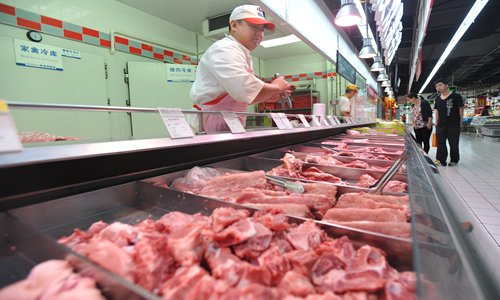HOME >> BUSINESS
Ban on Canadian products won’t affect China pork supply
By Song Lin and Shen Weiduo Source:Global Times Published: 2019/6/26 23:13:40
Ban on Canadian products won’t affect pork supply

Consumers shop for pork at a supermarket in Wuhan, capital of Central China's Hubei Province. File photo: VCG
China is expanding pork imports to ensure meat supply amid a domestic outbreak of African swine fever (ASF), and it will strengthen food safety inspection to ensure the rights and health of consumers are properly protected, experts said on Wednesday.
Beijing will suspend all Canadian meat imports after discovering counterfeit pork veterinary health certificates, the Chinese Embassy in Canada said in a statement on Wednesday.
Chinese authorities also found ractopamine residue in a batch of pork products exported from Canada to China. Ractopamine is added to animal feed to promote leanness, especially in animals being raised for meat, and its usage is banned in most countries, read the statement.
"We hope the Canadian side would attach great importance to this incident, complete the investigation as soon as possible and take effective measures to ensure the safety of food exported to China in a more responsible manner," said China's Foreign Ministry on Wednesday.
The move is a valid legal recourse by China to deal with substandard imports and protect the legitimate rights of domestic consumers, Mei Xinyu, an analyst with close ties with the Ministry of Commerce, told the Global Times on Wednesday.
Nevertheless, the block, coming amid an epidemic of incurable ASF in China, has caused concerns that the nation - the biggest pork consumer in the world - may face shortages of the meat.
The country's ASF outbreaks have been effectively controlled, China's Ministry of Agriculture and Rural Affairs said during a press conference on Wednesday. But due to various factors such as the fever and the rising breeding cost, the number of live pigs and sow herds has fallen by more than 20 percent year-on-year, said the ministry, adding that domestic pork supply is expected to be tight for the whole year.
Pork prices rose by 18.2 percent in May on a yearly basis, 3.8 percentage points higher than in April, according to data from the National Bureau of Statistics.
Wang Zuli, a researcher with the Chinese Academy of Agricultural Sciences, told the Global Times on Wednesday that import suspensions or declining pork imports from Canada and other countries would not affect the Chinese market as the country does not rely on foreign markets for pork supply.
China produced about 54 million tons of pork in 2018, while it only imported 1.19 million tons, according to official data.
Moreover, with declining domestic demand, various alternatives and multiple import sources, pork supply and demand are still balanced in China.
"Domestic demand for pork is declining, which is mainly due to rising prices," Wang said.
Poultry could replace nearly 2 million tons of pork consumption a year, Wang noted.
China increased meat imports including beef and mutton from January to April this year, according to data released by the agriculture ministry.
Ma Wenfeng, an agriculture analyst, told the Global Times on Wednesday that China imports very little pork from the US or Canada, whereas Germany is a major supplier for China, together with other alternatives, such as the UK and Spain.
Newspaper headline: Meat import scrutiny intensifies
Posted in: INDUSTRIES